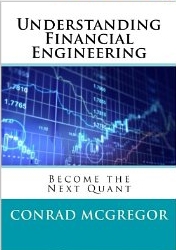I had a meeting last night with Wells Fargo/Wachovia that left an eerily bad taste in my mouth. Wells Fargo has always seemed like a strong and conservative bank that was a traditional deposit institution. Focus on providing good customer service to clients, lend to high quality individuals and companies, invest in high quality assets. They maintained their strength through this whole ordeal by maintaining strong lending standards and keeping away from the greed driven sub-prime lending and securitized banking shtick that got most of the other banks in such serious financial trouble.
The outcome of the Wells Fargo – Wachovia transaction is fairly simple: Wachovia has become a “Financial Products Company” (FPC) within Wells Fargo. They are going to structure products as a yield increasing/reserve reducing solution for Wells Fargo’s more traditional clients. The FPC salesman stated that Wachovia was able to source long-term volatility at a level that was more competitive than anyone else on the street. When I asked how they were able to do that and where they were offsetting the risk he bluntly stated that he was repackaging the risk into structured notes and selling it to pension funds and endowments. Risk that he could not offset was being held onto by Wells Fargo and hedged with short-term volatility, leaving Wells Fargo/Wachovia exposed to the curve risk between short and long-dated volatility.
Is there anything inherently terrible with what this FPC salesman was telling me? Not really. What threw me off was that this FPC salesman was clearly echoing what I have heard in the past. There is no new financial regulation and there is no new-found respect for balance sheet risk. This guy at “Wells Fargo Securities” was going to do the same exact thing that got us into the 2007/2008 banking mess and he is probably going to make a boatload of money doing it. It goes something like this:
- Source risk – whether it be interest rate risk, equity risk, volatility risk, commodity risk, currency risk, or housing price risk
- Create structured notes to sell the sourced risk to the unknowing and naive
- Whatever risk you cannot sell to a sucker, you keep on the banks balance sheet and suggest to upper management and the board that it is quite well “hedged”
- Collect bonuses, stock options, profit-sharing
- When the bonuses start getting thin, increase size with leverage (2008 could never happen again…)
- Wait till the next crisis emerges and your bank gets in serious trouble
- Rinse yourself off, hide from the taxpayer’s wrath, find another sucker institution and repeat
Not a single large commercial bank has been unwound in this whole mess and that is a scary thought. If we cannot break apart a Citi Group, what chance do we have in fixing a pool of larger failing institutions? The failure of Lehman Brothers brought the financial system on the precipice of a massive failure. We have only made the large institutions bigger by handing them other smaller players. Bank of America gets Merrill, JP Morgan gets Bear Stearns and Washington Mutual, Barclays get Lehman, PNC gets National City…etc. There hasn’t been any change in the machine. The machine will break again, it just depends on when. A more concentrated banking system creates more concentrated pools of risk. What’s even better is that there has been no motive for the banks to de-risk their balance sheets as we have seen from the wild success of Goldman Sachs. So saddle up boys and let the merry-go-round run off the wheel once more.



